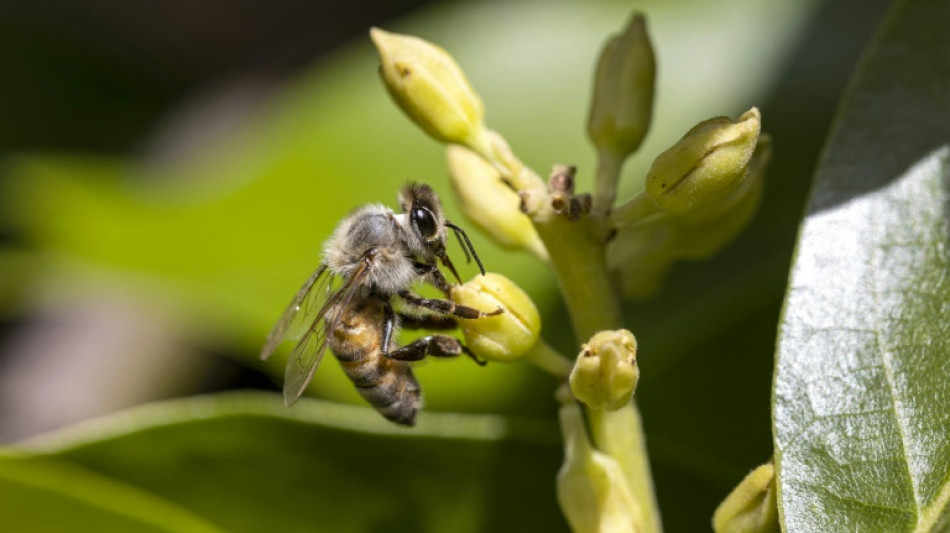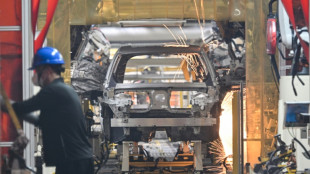
-
 Turkey's opposition says Erdogan's canal plan behind latest arrests
Turkey's opposition says Erdogan's canal plan behind latest arrests
-
Maresca hails 'nasty' Chelsea as top five bid stays alive

-
 Trump raises Putin doubts after Zelensky talks at pope's funeral
Trump raises Putin doubts after Zelensky talks at pope's funeral
-
Major blast at Iran port kills 4, injures hundreds

-
 Napoleon's sword to be sold at auction in Paris
Napoleon's sword to be sold at auction in Paris
-
Iran, US discuss nuclear deal in third round of talks

-
 Buenos Aires farewells native pontiff with call to action
Buenos Aires farewells native pontiff with call to action
-
Warholm sets hurdles world record at Diamond League, Holloway shocked

-
 US students 'race' sperm in reproductive health stunt
US students 'race' sperm in reproductive health stunt
-
Wikileaks founder Assange joins crowds for pope funeral

-
 Leader Marc Marquez claims Spanish MotoGP sprint victory
Leader Marc Marquez claims Spanish MotoGP sprint victory
-
Celtic win fourth successive Scottish Premiership title

-
 Jackson ends drought as Chelsea boost top five push
Jackson ends drought as Chelsea boost top five push
-
Warholm sets 300m hurdles world record in Diamond League opener

-
 Major blast at south Iran port kills 4, injures hundreds
Major blast at south Iran port kills 4, injures hundreds
-
Russia says retook Kursk from Ukraine with North Korean help

-
 Francis laid to rest as 400,000 mourn pope 'with an open heart'
Francis laid to rest as 400,000 mourn pope 'with an open heart'
-
Trump, Zelensky meet on sidelines of pope's funeral

-
 'Shared loss': Filipino Catholics bid Pope Francis farewell
'Shared loss': Filipino Catholics bid Pope Francis farewell
-
Families unable to reunite as India-Pakistan border slams shut

-
 Major blast at south Iran port injures hundreds
Major blast at south Iran port injures hundreds
-
Foreign carmakers strive for 'China Speed' to stay in race

-
 Pakistan says open to neutral probe into Kashmir attack after India threats
Pakistan says open to neutral probe into Kashmir attack after India threats
-
Hundreds of thousands at funeral mourn pope 'with an open heart'

-
 Quartararo sets Spanish MotoGP record to claim pole
Quartararo sets Spanish MotoGP record to claim pole
-
Hamas says open to 5-year Gaza truce, one-time hostages release

-
 Iran, US hold new round of high-stakes nuclear talks
Iran, US hold new round of high-stakes nuclear talks
-
Up at dawn for front-row seat to history at Francis's funeral

-
 Pakistan ready to 'defend sovereignty' after India threats
Pakistan ready to 'defend sovereignty' after India threats
-
Huge crowds flock to Vatican for Pope Francis's funeral

-
 Xi says China must 'overcome' AI chip challenges
Xi says China must 'overcome' AI chip challenges
-
Indian army says new exchange of gunfire with Pakistan

-
 Epstein accuser Virginia Giuffre takes own life in Australia: family
Epstein accuser Virginia Giuffre takes own life in Australia: family
-
Hundreds of buildings damaged, dozens injured in 6.3 Ecuador quake

-
 India and Pakistan's Kashmir fallout hits economy too
India and Pakistan's Kashmir fallout hits economy too
-
Francis's funeral to be grand farewell to 'pope of the poor'

-
 Pogacar faces defiant Evenepoel at Liege-Bastogne-Liege
Pogacar faces defiant Evenepoel at Liege-Bastogne-Liege
-
Chelsea eye great escape against Barcelona in Women's Champions League

-
 Iran, US to hold new round of high-level nuclear talks
Iran, US to hold new round of high-level nuclear talks
-
'Energy and effort' pay off for Reds as Blues' woes continue

-
 Albatross and closing birdie lift China's Liu to LPGA Chevron lead
Albatross and closing birdie lift China's Liu to LPGA Chevron lead
-
On the horizon? Wave of momentum for high seas treaty

-
 New to The Street Launches For The Causes(TM) Monthly Awareness Segments: Offering Free National Media to Charities and Organizations
New to The Street Launches For The Causes(TM) Monthly Awareness Segments: Offering Free National Media to Charities and Organizations
-
Top Mistakes to Avoid When Building Credit History

-
 Developing countries should fast-track US trade deals: World Bank president
Developing countries should fast-track US trade deals: World Bank president
-
Grizzlies' Morant 'doubtful' for must-win game 4 v Thunder

-
 Trump in Rome for pope funeral in first foreign trip of new term
Trump in Rome for pope funeral in first foreign trip of new term
-
Trump says Russia-Ukraine deal 'very close' after new Kremlin talks

-
 US rookies lead PGA pairs event with McIlroy and Lowry in hunt
US rookies lead PGA pairs event with McIlroy and Lowry in hunt
-
Trump tariff promises get a reality check


Insect compasses, fire-fighting vines: 2023's nature-inspired tech
Even as human-caused climate change threatens the environment, nature continues to inspire our technological advancement.
"The solutions that are provided by nature have evolved for billions of years and tested repeatedly every day since the beginning of time," said Evripidis Gkanias, a University of Edinburgh researcher.
Gkanias has a special interest in how nature can educate artificial intelligence.
"Human creativity might be fascinating, but it cannot reach nature's robustness -- and engineers know that," he told AFP.
From compasses mimicking insect eyes to forest fire-fighting robots that behave like vines, here's a selection of this year's nature-based technology.
- Insect compass -
Some insects -– such as ants and bees -– navigate visually based on the intensity and polarisation of sunlight, thus using the sun's position as a reference point.
Researchers replicated their eye structure to construct a compass capable of estimating the sun's location in the sky, even on cloudy days.
Common compasses rely on Earth's weak magnetic field to navigate, which is easily disturbed by noise from electronics.
A prototype of the light-detecting compass is "already working great", said Gkanias, who led the study published in Communications Engineering.
"With the appropriate funding, this could easily be transformed into a more compact and lightweight product" freely available, he added.
And with a little further tweaking, the insect compass could work on any planet where a big celestial light source is visible.
- Water-collecting webs -
Fabric inspired by the silky threads of a spider web and capable of collecting drinking water from morning mist could soon play an important role in regions suffering water scarcity.
The artificial threads draw from the feather-legged spider, whose intricate "spindle-knots" allow large water droplets to move and collect on its web.
Once the material can be mass produced, the water harvested could reach a "considerable scale for real application", Yongmei Zheng, a co-author of the study published in Advanced Functional Materials, told AFP.
- Fire-fighting vines -
Animals aren't the only source of inspiration from nature.
Scientists have created an inflatable robot that "grows" in the direction of light or heat, in the same way vines creep up a wall or across a forest floor.
The roughly two-metre-long tubular robot can steer itself using fluid-filled pouches rather than costly electronics.
In time, these robots could find hot spots and deliver fire suppression agents, say researchers at the University of California, Santa Barbara.
"These robots are slow, but that is OK for fighting smouldering fires, such as peat fires, which can be a major source of carbon emissions," co-author Charles Xiao told AFP.
But before the robots can climb the terrain, they need to be more heat-resistant and agile.
- Kombucha circuits -
Scientists at the Unconventional Computing Laboratory at the University of the West of England in Bristol have found a way to use slimy kombucha mats –- produced by yeast and bacteria during the fermenting of the popular tea-based drink -- to create "kombucha electronics".
The scientists printed electrical circuits onto dried mats that were capable of illuminating small LED lights.
Dry kombucha mats share properties of textiles or even leather. But they are sustainable and biodegradable, and can even be immersed in water for days without being destroyed, said the authors.
"Kombucha wearables could potentially incorporate sensors and electronics within the material itself, providing a seamless and unobtrusive integration of technology with the human body," such as for heart monitors or step-trackers, lead author Andrew Adamatzky and the laboratory's director, told AFP.
The mats are lighter, cheaper and more flexible than plastic, but the authors caution that durability and mass production remain significant obstacles.
- Scaly robots -
Pangolins resemble a cross between a pine cone and an anteater. The soft-bodied mammals, covered in reptilian scales, are known to curl up in a ball to protect themselves against predators.
Now, a tiny robot might adapt that same design for potentially life-saving work, according to a study published in Nature Communications.
It is intended to roll through our digestive tracts before unfurling and delivering medicine or stopping internal bleeding in hard-to-reach parts of the human body.
Lead author Ren Hao Soon of the Max Planck Institute for Intelligent Systems was watching a YouTube video when he "stumbled across the animal and saw it was a good fit".
Soon needed a soft material that wouldn't cause harm inside the human body, with the advantages of a hard material that could, for example, conduct electricity. The Pangolin's unique structure was perfect.
The tiny robots are still in their initial stages, but they could be made for as little as 10 euros each.
"Looking to nature to solve these kinds of problems is natural," said Soon.
"Every single design part of an animal serves a particular function. It’s very elegant."
L.Harper--AMWN



